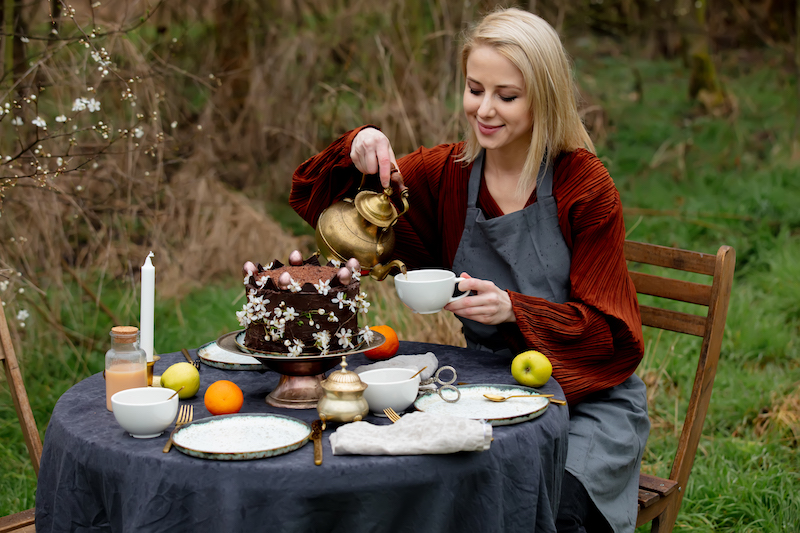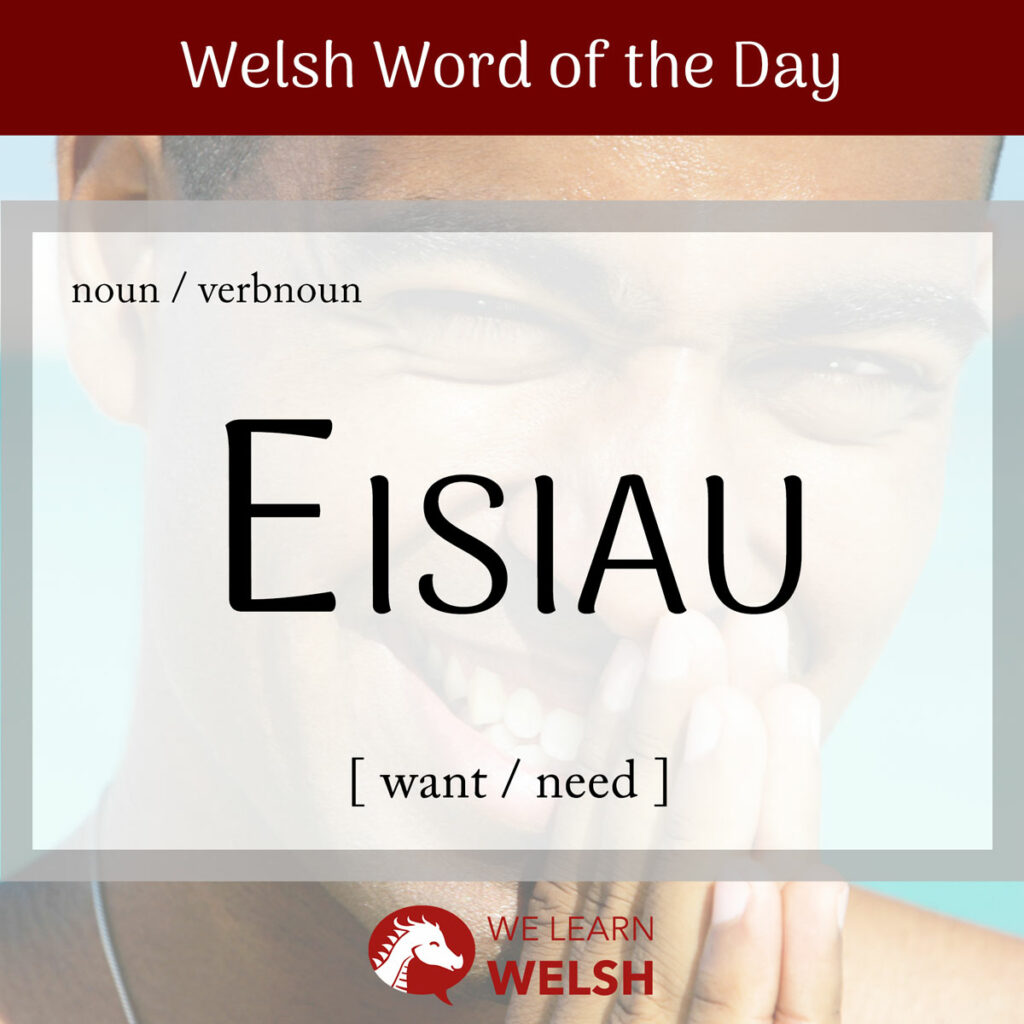Eisiau is a very important Welsh word, used in a wide range of situations. It can be most simply translated as want, but in reality, it covers a variety of meanings, from desire, to need or lack.
Although eisiau is technically a noun, it functions as a verbnoun in everyday speech, so we can translate I want as Dw i eisiau. Unfortunately, it’s not as simple as that. In North Wales, eisiau is used to mean want, with angen meaning need, but in the South, it’s more common to use moyn for want, and eisiau means something more like need.
eisiau
want or need
There aren’t a lot of borrowings from Latin in Welsh, but eisiau is one of them. It comes from the adjective exiguus, which describes something inadequate or simply small.
Eisiau is an abstract masculine noun and has no plural. Because it begins with a vowel sound, there are also no mutations of eisiau. However, that doesn’t mean you only have to learn one form of the word! Another tricky aspect of Welsh grammar is h-prosthesis, where words that begin with vowels sometimes add an ‘h’ sound onto the beginning. This happens after ei (his/hers) when it is used to mean hers, after ein (our), and after eu (their). So you would say ei heisiau, ein heisiau or eu heisiau.
Oes arno fo eisiau’r bisgedi? Oes, mae eu heisiau arno fo.
Does he want the biscuits? Yes, he wants them.
The above phrase is a very formal way of saying this, but it’s a useful example of when you would need to include h-prosthesis.
Because eisiau is technically a noun, when you’re using it as a verb, you need to say dw i eisiau (I want) rather than dw i’n eisiau/dw i yn eisiau, which would be incorrect. This is different to other verbs in Welsh. For example, I like is dw i’n hoffi.
The most accurate way of translating I want into Welsh would actually be mae arna i eisiau (there is want on me), as in mae arni hi eisiau ffrog (there is wanting a dress on her = she wants a dress). However, you can definitely say dw i eisiau or rwyt ti eisiau (you want) in casual spoken Welsh; even native Welsh speakers will do so.

For example, hungry in Welsh is eisiau bwyd, with bwyd simply meaning food. Welsh can be a very literal language! Formally, you would say mae eisiau bwyd arna i, but it’s far more common to simply say dw i eisiau bwyd. There are a lot of similar constructions using eisiau, such as eisiau diod (thirsty, wanting drink) or eisiau gwaith (unemployed, wanting work).
Gad i ni fwyta’n fuan, dw i rili eisiau bwyd.
Let’s eat soon, I’m really hungry.
The choice between dw i eisiau and mae eisiau arna i creates a bit of a conundrum for yes and no questions. In Welsh, there are a variety of words for yes and no, depending on the question. For example, for wyt questions, the response is usually ydw (yes) or nac ydw (no). An example of an wyt question would be Wyt ti’n teimlo’n iawn? (Do you feel alright?)
For questions starting with the word oes (is, as in is there?), the response would be oes (yes) or nac oes (no). For questions starting with bydd (will, as in will there be?), it would be bydd (yes) or na fydd (no). Then there are even more rules to remember – for questions in the past tense, the answer is do (yes) or naddo (no).
If this all seems overwhelming, don’t worry too much – you’ll get it with time and practice. In the meantime, you can easily make yourself understood by responding with a casual ie (yes) or na (no) to any question.
The issue with questions involving eisiau is that technically, they are oes questions: Oes eisiau bwyd arnoch chi/arnat ti? (Are you hungry?) However, most of the time, they’ll instead be phrased as wyt or ydych questions, depending on whether the casual ti (you) or the formal chi (you) is being used: Wyt ti eisiau bwyd? or Ydych chi eisiau bwyd?
So, when asked Wyt ti eisiau bwyd?, do we respond ydw / nac ydw or oes / nac oes? On average, most people will probably go with the former. However, some speakers, particularly those from North Wales, might still use oes and nac oes, in reference to the original form of the question. This would sound very formal to a Southerner.
Another colloquialism you’re likely to come across is isio or isie, which are more casual ways of saying eisiau. The former is Northern, and the latter is Southern. You might also hear t’isio / t’isie. This is a contraction of wyt ti eisiau (do you want) and is both very informal and very common, especially with younger speakers. It’s a great phrase to learn if you want your Welsh to sound more natural.
T’isio paned?
D’you want a cuppa? (N)
T’isie paned?
D’you want a cuppa? (S)
The main take-away from all of this is that there are quite a lot of different ways to use the word eisiau! And we haven’t even covered all of them. Here’s a few more useful phrases:
- os bydd eisiau = if need be
- gweld eisiau = to lack or to be without
- o’th eisiau = for lack of
- hollti bola eisiau = dying to
- sy eisiau = what’s needed is

Lastly, let’s talk synonyms. As mentioned, moyn is the most common choice in the South, where eisiau is more likely to be used to mean need. Moyn has evolved from ymofyn, coming from the word gofyn (to ask) and the reflexive prefix ym.
Conversely, in the North, eisiau means want and you’ll need to learn the word angen for need. Angen is a verbnoun like eisiau, so it functions in a similar way. For example, you’d technically say mae ei angen arnaf to mean I need it. Still, like with eisiau, it’s perfectly normal and acceptable to simply say dw i angen (I need). You just need to remember to omit the particle yn, because dw i’n angen is incorrect.
And there are even more options! All over Wales, people also use the simpler construction dw i am (literally: I am for) as a substitute for I want. It’s a bit like the English phrase I’m up for. You can even use chwantu (to desire), which is surprisingly not related to the English word want. It’s safe to say that wanting in Welsh is quite a complicated business.

